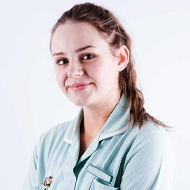
Rachel Liddell went out of her way to help her blind and deaf clients.
A veterinary nursing student from Ayrshire has been praised for going 'above and beyond' during the coronavirus pandemic by helping humans as well as animals.
Twenty-year-old Rachel Liddell is studying for a Level 3 Diploma in Veterinary Nursing at Scotland’s Rural College (SRUC) while working at The Oaks Veterinary Centre in Saltcoats.
When a blind client had to have his guide dog put to sleep, Rachel – who was writing sympathy cards – realised that he wouldn't be able to read the card if she sent one.
Wanting the client to receive a card that was personal that he could read, Rachel contacted the Guide Dogs for the Blind Association and asked if they could make a brail insert to send in a card.
Rachel also extended her kindness to a deaf client who brought his dog in for vaccinations. Upon realising the client was deaf, she typed out what she wanted to say to the owner on a sign language app. When she took the dog back to the car park, she then signed an overview of the consultation.
Vet Sarah Lamont, who works with Rachel at The Oaks, said: “We have a lot of talented nurses at our practice but there is something very special about Rachel. She is far beyond her years in terms of her nursing skills but also has a special quality about her that you cannot teach.
“She goes above and beyond for people and I have noticed this even more so as we have been going through the challenges of Covid-19. She has offered to deliver medication and food to people who are shielding and can’t get out, even if this means doing it in her free time. Nothing is a bother to her.”
Rachel, who has been unable to sit her final exams due to Covid-19, said: “I have always been passionate about helping animals and being part of the first line of care. Veterinary nursing is so rewarding and being able to nurse a patient back to full health and return it to its family is an amazing feeling.
“I have really enjoyed being in practice and feeling part of a very close team as well as learning something new every day to further my knowledge and help each and every patient.”



 The RCVS has announced a new version of its 1CPD mobile app, with enhanced features for veterinary surgeons and veterinary nurses to record their continuing professional development.
The RCVS has announced a new version of its 1CPD mobile app, with enhanced features for veterinary surgeons and veterinary nurses to record their continuing professional development.